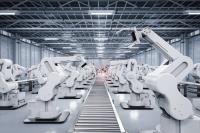 Add My Company
Add My Company
Sign In

In all industries, varying ways of streamlining processes to benefit costs and productivity are always being sought.
In larger companies, such as manufacturers or in the technology sector, ensuring that processes are being performed in the best and most efficient way is a matter of necessity.
That’s where automation comes in; it is a solution that has helped many companies develop the way that certain processes are executed productively.
But what exactly is automation? Can it affect your company? And most importantly, what does automation mean for fleet managers? In this post, we dispel the myths, explain the meanings and discover the statistics behind automation.
What Is Automation?
Although there are several ways to implement automation within a company, understanding exactly what it is, and how you could utilise it best, is vital.
Automation is when any automatic equipment is introduced to a manufacturing (or other process) facility, in hope of creating a sleeker operation and generating a better overall system.
This can be done in many ways and is exceptionally common in large manufacturing sites.
As technology gets invariably better, the idea behind automation is relatively simple; if a job can be completed by an automatic machine in half the time, with fewer expenditures and with less room for human errors, then a company would benefit greatly from switching to an automated methodology.
For more information on Automation & What That Means for Fleet Managers talk to Fueltek Ltd
Enquire Now
List your company on FindTheNeedle.

